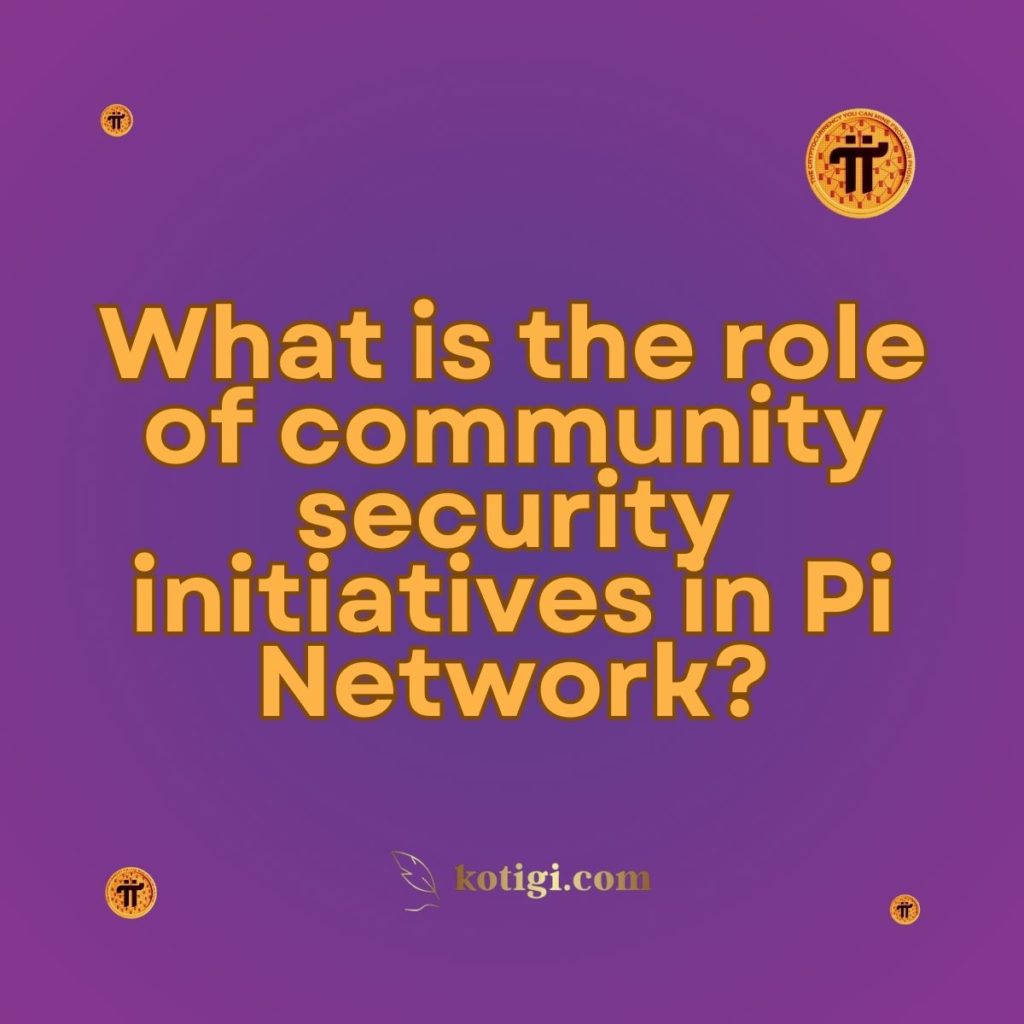
What is the role of community security initiatives in Pi Network?
Community security initiatives within the Pi Network are essential for safeguarding user assets and enhancing the integrity of the network. These initiatives leverage collective efforts, education, and proactive measures to combat threats and vulnerabilities effectively.
Introduction
In the ever-evolving world of cryptocurrency, security remains a paramount concern for users and developers alike. The Pi Network, designed to allow everyday individuals to mine cryptocurrency through their mobile devices, recognizes the vital role of community involvement in maintaining the security of its ecosystem. Community security initiatives are fundamental to building trust, educating users, and fostering collaboration to address potential threats. This article explores the various community security initiatives within Pi Network, their significance, and their impact on creating a safer environment for all users.
Understanding Community Security Initiatives
What Are Community Security Initiatives?
Community security initiatives refer to collaborative efforts undertaken by users and developers to promote security awareness, protect user assets, and enhance the overall integrity of the Pi Network. These initiatives encompass a wide range of activities, including educational campaigns, reporting systems for suspicious activities, and partnerships with security experts.
The Importance of Community Involvement
Community involvement is crucial in any decentralized network. It fosters a sense of ownership and responsibility among users. Engaging the community in security initiatives allows Pi Network to leverage the collective vigilance of its user base to identify and mitigate potential threats. This collaborative approach not only enhances security but also strengthens community ties.
Educational Campaigns
Importance of Education
Educational campaigns are fundamental to enhancing security awareness among Pi Network users. These initiatives equip users with the knowledge and tools necessary to protect their assets effectively.
Workshops and Webinars
Regularly scheduled workshops and webinars can help users understand best practices in cryptocurrency security. Topics may include recognizing phishing attempts, secure wallet management, and general online safety tips.
Informative Resources
The Pi Network community often shares articles, videos, and guides on social media and community forums. These resources enable users to stay informed about the latest security threats and learn how to combat them effectively.
Reporting and Feedback Mechanisms
User Reporting Tools
Creating effective reporting and feedback mechanisms is vital for maintaining security within the Pi Network. Users should feel empowered to report suspicious activities or vulnerabilities they encounter. Implementing user-friendly reporting tools within the Pi Network app allows users to easily flag suspicious transactions or potential scams.
Role of Community Moderators
Empowering trusted community members as moderators can help monitor discussions and report malicious activities. These moderators play a crucial role in creating a safer environment for all users by addressing concerns and guiding users on security matters.
Feedback Loop
Establishing a feedback loop where users can share their experiences and suggestions further enhances the community’s ability to respond to security challenges. This approach creates a dynamic environment where security measures can evolve based on real-world insights.
Collaborations with Security Experts
Establishing Advisory Panels
Engaging with cybersecurity experts can provide valuable insights and strategies for enhancing the security of the Pi Network. Establishing advisory panels comprising cybersecurity professionals can guide the community in implementing effective security measures and responding to emerging threats.
Research Partnerships
Collaborating with universities and research institutions can help Pi Network stay ahead of potential vulnerabilities. These partnerships may facilitate research projects aimed at developing proactive security strategies tailored to the unique needs of the Pi Network.
Workshops with Experts
Hosting workshops featuring cybersecurity experts allows users to gain firsthand knowledge of security practices and challenges. These sessions can cover a range of topics from basic security measures to advanced threat detection techniques.
Community Incentives for Reporting Vulnerabilities
Bug Bounty Programs
Offering incentives for users who report security vulnerabilities fosters a proactive security culture within the Pi Network. Implementing bug bounty programs allows users to earn rewards for identifying and reporting security issues, encouraging a collaborative effort to enhance network security.
Recognition and Rewards
Acknowledging and rewarding users who contribute to security initiatives fosters a sense of community. Such recognition encourages continued involvement, as users feel their contributions are valued.
Community Challenges
Organizing community challenges focused on identifying vulnerabilities can further motivate users to engage in security practices. This gamification of security efforts not only boosts participation but also enhances collective awareness.
Regular Security Audits and Updates
Importance of Audits
Conducting regular security audits is essential for identifying vulnerabilities and ensuring the network remains secure. Engaging third-party security firms to conduct audits provides an unbiased assessment of the network’s security posture and identifies areas for improvement.
Continuous Software Updates
Regular updates to the Pi Network software are critical for addressing potential vulnerabilities. These updates ensure users benefit from the latest advancements in cybersecurity and that the network remains resilient against emerging threats.
User Notifications
Implementing a notification system to inform users about security updates and best practices ensures that they are always aware of the current security measures in place. This transparency builds trust and encourages users to adopt recommended practices.
Promoting Best Practices Among Users
Secure Wallet Management
Encouraging users to adopt best practices in cryptocurrency management is essential for safeguarding their assets. Providing guidelines on how to create strong passwords, use two-factor authentication, and securely store seed phrases can significantly reduce the risk of theft.
Awareness of Phishing Scams
Educating users about common phishing tactics and how to recognize suspicious links can help prevent unauthorized access to their accounts. Raising awareness of these scams empowers users to make informed decisions while navigating the cryptocurrency landscape.
Safe Browsing Practices
Teaching users about safe browsing practices, such as avoiding public Wi-Fi for transactions and verifying website URLs, can further enhance their security. These small but significant habits can drastically reduce the risk of falling victim to cyberattacks.
Building a Supportive Community Environment
Fostering Collaboration
Creating an inclusive and supportive community environment encourages users to share their experiences and knowledge regarding security. Forums, discussion groups, and social media channels can serve as platforms for users to discuss security challenges and solutions.
Peer-to-Peer Support
Encouraging peer-to-peer support within the community can enhance overall security. Experienced users can offer guidance to newcomers, helping them navigate the complexities of cryptocurrency security and fostering a culture of vigilance.
Community Engagement Events
Hosting community engagement events that focus on security issues can further strengthen community ties. These events can facilitate networking and knowledge sharing, creating a more informed and resilient user base.
The Future of Community Security in Pi Network
Evolving Security Measures
As the cryptocurrency landscape evolves, so too must the security measures employed by the Pi Network community. Continuous evaluation and adaptation of security strategies will be necessary to address emerging threats and vulnerabilities.
Emphasis on Decentralized Security
The future of community security in Pi Network will likely emphasize decentralized security measures, allowing users to collectively monitor and protect the network. This collaborative approach will enhance the overall resilience of the community and contribute to a safer environment for all users.
Long-Term Vision
Establishing a long-term vision for community security initiatives can provide a roadmap for future efforts. This vision should focus on fostering a culture of security awareness, continuous education, and proactive engagement among all users.
Conclusion
Community security initiatives play a pivotal role in fostering a secure environment within the Pi Network. By promoting education, collaboration, and proactive measures, these initiatives empower users to take charge of their security and contribute to the integrity of the network. As the cryptocurrency landscape continues to evolve, the strength of the Pi Network will rely on the collective efforts of its community in addressing security challenges and protecting user assets.
Key Takeaways
| Key Takeaway | Details |
|---|---|
| Community Involvement | Engaging users in security initiatives fosters a sense of ownership and collective responsibility. |
| Educational Campaigns | Workshops, webinars, and resources enhance user awareness and knowledge about security practices. |
| Reporting Mechanisms | User-friendly tools empower users to report suspicious activities and contribute to network security. |
| Collaboration with Experts | Partnerships with cybersecurity professionals provide valuable insights and strategies for security. |
| Incentives for Reporting | Bug bounty programs and recognition encourage users to actively participate in identifying vulnerabilities. |
| Promoting Best Practices | Encouraging secure wallet management and awareness of phishing scams reduces the risk of asset theft. |




